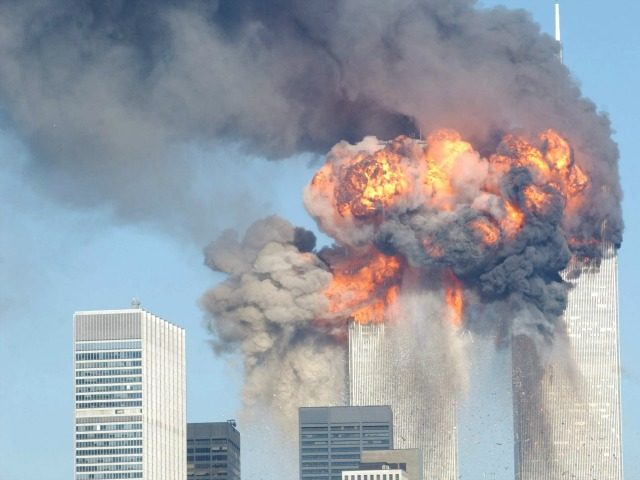WASHINGTON—The Supreme Court on Monday ruled on lawsuits involving the September 11, 2001, terrorist attacks that have been running since then, ruling mostly in favor of the federal agents sued for their actions following the attacks, but remanding one issue back to the lower courts for another hearing.
“After the September 11 terrorist attacks in this country, and in response to the deaths, destruction, and dangers they caused, the United States Government ordered hundreds of illegal aliens to be taken into custody and held,” Justice Anthony Kennedy began for the Court.
He noted that for some of these aliens, this “custody lasted for days and weeks, then stretching into months.”
Some of these illegal aliens sued, going after not just the government, but individually seeking money and punishment for the individual federal agents who dealt with the aliens, as well as national leaders such as Attorney General John Ashcroft.
The aliens sought a “Bivens action” against those agents and leaders, named for a 1971 Supreme Court case supported by liberals, under which federal officers can sometimes be sued personally for violating select constitutional rights. That case—and two subsequent cases that expanded on it—are opposed by conservatives because Congress has passed statutes for pursuing only state and local government for money when they violate federal civil rights, but never passed a law that would do the same regarding federal agents.
Because the trial court was, for the most part, dealing with motions to dismiss these cases before any evidence was introduced, under court rules, the factual allegations are treated as true at this stage, with courts looking to which side the law would be on if those allegations were true. On appeal, the U.S. Court of Appeals for the Second Circuit largely sided with the plaintiffs.
At the Supreme Court, the majority cautioned that “it is a significant step under separation-of-powers principles for a court to determine that it has the authority, under the judicial power, to create and enforce a cause of action for [monetary] damages against federal officials in order to remedy a constitutional violation.”
The Supreme “Court has made clear that expanding the Bivens remedy is now a disfavored judicial activity,” Kennedy continued, quoting a 2001 case where the Court noted that it has “consistently refused to extend Bivens to any new context or new category of defendants.”
“The question is ‘who should decide’ whether to provide for a damages remedy, Congress or the courts?” Kennedy added, when it comes to determining who can sue and for what. “The answer most often will be Congress.”
The Court further noted that allowing individual lawsuits in a case like this would lead to intrusions into confidential national-security discussions within the executive branch. “National security policy is the prerogative of the Congress and President.”
This does not necessarily mean that people claiming unlawful treatment cannot sue at all. There are “alternative forms of judicial relief” when federal officers violate individual rights, such as perhaps habeas corpus if a person is detained illegally.
Justice Kennedy’s opinion also held that even if the plaintiffs’ rights were violated, the individual agents involved were still entitled to qualified immunity, which shelters their homes and personal finances from a lawsuit for any mistakes they might have made when on duty.
“[The] Court has held that qualified immunity protects all but the plainly incompetent or those who knowingly violate the law.” He went on to show that if there was any violation of civil rights, the federal agents carrying out their orders in the aftermath of 9/11 were not crossing such a line that “it would have been clear to a reasonable officer” that their actions were illegal.
The justices also cast aside arguments that these officers formed a conspiracy to violate plaintiffs’ civil rights—which is illegal under 42 U.S.C. § 1985—for several legal reasons.
Regarding plaintiffs’ claims that their rights were violated because of mistreatment in prison, the Court remanded that issue back to the lower courts for evidence and further development.
“If the facts alleged in the complaint are true, then what happened to [plaintiffs] in the days following September 11 was tragic,” the majority began in conclusion. “Nothing in this opinion should be read to condone the treatment to which they contend they were subjected.”
But rather than whether the government’s “conduct was proper” or “gave decent respect to [plaintiffs’] dignity and well-being,” the only question before the Court is whether the judiciary is empowered to recognize a private right of action under which these plaintiffs could sue those federal agents and national leaders for money.
Concluding that under the Constitution, such questions are decided by Congress, the Court reversed the Second Circuit in part, vacated in part, and remanded in part back to the lower court.
Justice Clarence Thomas joined most of Kennedy’s opinion but wrote separately to set forth an alternative approach to Bivens, one that limits Bivens to the bare facts of its three Supreme Court cases and extends the doctrine no further.
He also asserted that the Court should reconsider its qualified immunity doctrine, writing that the Court has “diverged from the historical inquiry mandated by the [relevant] statute,” cautioning that “[u]ntil we shift the focus of our inquiry to whether immunity existed at common law [in 1871], we will continue to substitute our own policy preferences for the mandates of Congress.”
Justices Ruth Bader Ginsburg and Stephen Breyer dissented. Justices Sonia Sotomayor, Elena Kagan, and Neil Gorsuch all were recused, resulting in only six justices hearing the matter.
The case is Ziglar v. Abbasi, consolidating Nos. 15-1358, 15-1359, and 15-1363.
Ken Klukowski is senior legal editor for Breitbart News. Follow him on Twitter @kenklukowski.

COMMENTS
Please let us know if you're having issues with commenting.